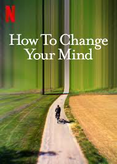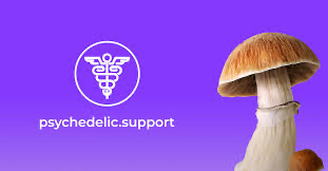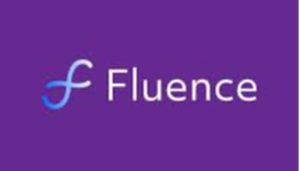
More and more, trauma survivors are turning to psychedelics to treat their trauma related issues.
Best selling author Michael Pollan reintroduced the mainstream to psychedelics in his 2018 best-selling book How to Change Your Mind: What the New Science of Psychedelics Teaches Us About Consciousness, Dying, Addiction, Depression, and Transcendence.
Netflix then produced a 2022 American docuseries based on the book. His research-based reporting and immersive experiences with psilocybin, LSD, and 5-MeO-DMT have served as a far reaching bell that psychedelic research and science is gaining steam once again.
While there has been plenty of attention in recent months on the rollout of legal access to psychedelics—in Oregon, Colorado, and beyond—what often gets lost in the hype is just how much psychedelic use is growing across the globe, independent of these stories.
Beyond the currently legal avenues of ketamine therapy, psilocybin services in Oregon, and clinical trials, more and more people are also seeking international retreats, underground guides, community ceremonies, and mail-order mushrooms. Not everyone who uses psychedelics in these contexts will require professional support, but many will—and almost all will benefit from a workforce of professionals who are educated about the risks and benefits of psychedelic use–whether it be a coach, their therapist, social worker, or family doctor.
No matter the classification of a psychedelic substance, a person’s experience on any drug is heavily influenced by the internal state of the person and the environment and social context where the substance is taken. This is commonly referred to as the "set and setting". Psychedelics amplify emotions and thoughts, and depending on the person’s internal state and environment, can bring euphoria or terrifying waves of anxiety and paranoia.
To create a safe and protected atmosphere in clinical research trials, a great amount of attention is paid to the physical setup of the room and the supportive care provided by sitters. A person is first psychologically prepared for the experience to reduce stress and manage expectations prior to entering the altered state of consciousness, and a trained sitter is always present to support whatever unfolds. A person’s physical and mental state, as well as the environment, are critical factors that become interwoven into the narrative of the journey.
Similarly, psychedelic harm reduction is the set of ideas and strategies that is meant to reduce harm and risks around the use of psychedelics, both personal and societal. It’s important to note that psychedelic harm reduction can be applied to ceremonial, recreational, and medical uses of psychedelics.
The therapeutic potential of psychedelics in the treatment of mood disorders, post-traumatic stress disorder, and addictions is currently under investigation in several clinical trials. The treatment protocols have a preparatory phase, psychedelic dosing sessions, and integration sessions after each psychedelic experience. The in-depth integration component is a critical part of the treatment.
I have over 25 years experience working with trauma survivors, and started educating myself on psychedelics in 2022 and
have completed the following courses on PHRI, Psychedelic Harm Reduction and Integration:
Clinicians Exploring Psychedelic Therapy by Psychedelic Support
Exploring Psychedelics: Discovery, Research & Effects by Psychedelic Support
Riding The Wave: Principles of Psychedelic Harm Reduction by Psychedelic Support
Ethical Right Relationship in Psychedelic Therapy: 101 and 102 by Psychedelic Support
Putting Psychedelic Integration into Practice by Fluence
Psychedelic Integration: Premise & Promise by Fluence
Ketamine Assisted Psychotherapy by Fluence
Best selling author Michael Pollan reintroduced the mainstream to psychedelics in his 2018 best-selling book How to Change Your Mind: What the New Science of Psychedelics Teaches Us About Consciousness, Dying, Addiction, Depression, and Transcendence.
Netflix then produced a 2022 American docuseries based on the book. His research-based reporting and immersive experiences with psilocybin, LSD, and 5-MeO-DMT have served as a far reaching bell that psychedelic research and science is gaining steam once again.
While there has been plenty of attention in recent months on the rollout of legal access to psychedelics—in Oregon, Colorado, and beyond—what often gets lost in the hype is just how much psychedelic use is growing across the globe, independent of these stories.
Beyond the currently legal avenues of ketamine therapy, psilocybin services in Oregon, and clinical trials, more and more people are also seeking international retreats, underground guides, community ceremonies, and mail-order mushrooms. Not everyone who uses psychedelics in these contexts will require professional support, but many will—and almost all will benefit from a workforce of professionals who are educated about the risks and benefits of psychedelic use–whether it be a coach, their therapist, social worker, or family doctor.
No matter the classification of a psychedelic substance, a person’s experience on any drug is heavily influenced by the internal state of the person and the environment and social context where the substance is taken. This is commonly referred to as the "set and setting". Psychedelics amplify emotions and thoughts, and depending on the person’s internal state and environment, can bring euphoria or terrifying waves of anxiety and paranoia.
To create a safe and protected atmosphere in clinical research trials, a great amount of attention is paid to the physical setup of the room and the supportive care provided by sitters. A person is first psychologically prepared for the experience to reduce stress and manage expectations prior to entering the altered state of consciousness, and a trained sitter is always present to support whatever unfolds. A person’s physical and mental state, as well as the environment, are critical factors that become interwoven into the narrative of the journey.
Similarly, psychedelic harm reduction is the set of ideas and strategies that is meant to reduce harm and risks around the use of psychedelics, both personal and societal. It’s important to note that psychedelic harm reduction can be applied to ceremonial, recreational, and medical uses of psychedelics.
The therapeutic potential of psychedelics in the treatment of mood disorders, post-traumatic stress disorder, and addictions is currently under investigation in several clinical trials. The treatment protocols have a preparatory phase, psychedelic dosing sessions, and integration sessions after each psychedelic experience. The in-depth integration component is a critical part of the treatment.
I have over 25 years experience working with trauma survivors, and started educating myself on psychedelics in 2022 and
have completed the following courses on PHRI, Psychedelic Harm Reduction and Integration:
Clinicians Exploring Psychedelic Therapy by Psychedelic Support
Exploring Psychedelics: Discovery, Research & Effects by Psychedelic Support
Riding The Wave: Principles of Psychedelic Harm Reduction by Psychedelic Support
Ethical Right Relationship in Psychedelic Therapy: 101 and 102 by Psychedelic Support
Putting Psychedelic Integration into Practice by Fluence
Psychedelic Integration: Premise & Promise by Fluence
Ketamine Assisted Psychotherapy by Fluence
PHRI coaching: $ 200 per hour; can be added to trip sitting
Trip Sitting: $100 per hour, minimum 3 hours paid in advance when scheduled, virtual or inperson options depending on your location.
Travel time: $20 per hour if you want me to come to you in person depending on your location.
You MUST have an established therapeutic relationship with your own therapist in order to schedule PHRI coaching sessions.
I do NOT provide any psychedelic substances!
Trip Sitting: $100 per hour, minimum 3 hours paid in advance when scheduled, virtual or inperson options depending on your location.
Travel time: $20 per hour if you want me to come to you in person depending on your location.
You MUST have an established therapeutic relationship with your own therapist in order to schedule PHRI coaching sessions.
I do NOT provide any psychedelic substances!
Beth Harp, LPC and it's associates, affirm the contents of this website are presented in the interest of harm reduction, safety, and education and do not in any way condone or encourage the use, purchase, sale, or transfer of any illegal substances. Also, we do not condone or encourage partaking in any unlawful activities. If you choose to engage with psychedelics, first be sure you are aware of the legalities and potential implications to your well-being.



